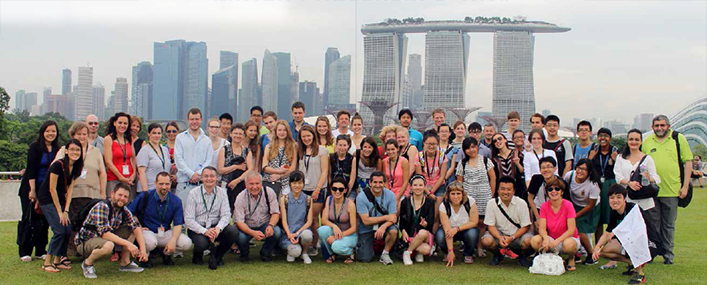
From 9 to 13 June, 130 students from 24 schools across 15 countries converged in Raffles Institution (RI) for the Raffles-Maurick International Water Conference, which is believed to be the first water summit in the world targeted at teenagers. Jointly organised by RI and Maurick College from the Netherlands, the five-day summit aimed to help youths better understand global water issues, as well as develop scientific, diplomatic and leadership skills among its young participants. Topics discussed include water quality, treatment and monitoring; social responsibility, awareness and advocacy; national strategies and water conflicts; community involvement projects and integrated urban water designs.
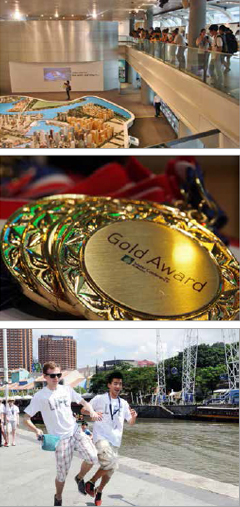 Singapore has no natural water resources in the form of large river systems or aquifers, while the Netherlands faces challenges keeping seawater out and freshwater in. Yet, both countries have successfully tackled these problems through science and innovation. The Netherlands has become a leader in water technologies, harnessing salinity gradient (the change in salinity as fresh water meets the sea) to generate electricity. Meanwhile, land-scarce Singapore expanded its water reservoirs and used membrane technology to purify water. Singapore has no natural water resources in the form of large river systems or aquifers, while the Netherlands faces challenges keeping seawater out and freshwater in. Yet, both countries have successfully tackled these problems through science and innovation. The Netherlands has become a leader in water technologies, harnessing salinity gradient (the change in salinity as fresh water meets the sea) to generate electricity. Meanwhile, land-scarce Singapore expanded its water reservoirs and used membrane technology to purify water.
The conference opened with presentations by RI Senior Deputy Principal Mr Magendiran, Guest of Honour H.E. Mr Tormod C. Endresen, Norway's ambassador to Singapore, and Founder of the Third
World Centre for Water Management, Professor Asit Biswas. Professor Biswas explained that up to half of the world's population still do not have ready access to safe drinking water, and the root of the problem is poor water management systems implemented by governments and local authorities.
Following the opening ceremony was a Dialogue Session titled "The Future of Water", where leading authorities on water issues provided further insight into the global water situation. Panelists included Guest of Honour H.E. Mr Tormod C. Endresen, Norway's ambassador to Singapore, Special Guest H.E Mr Jacques Werner, the Netherland's ambassador to Singapore, together with Professor Asit Biswas (Distinguished Visiting Professor, Lee Kuan Yew School of Public Policy and Founder, Third World Centre for Water Management), Mr Paul Reiter (Strategic Counsel to International Water Association), Mr Wong Lup Wai (Chief Operating Officer, Hyflux Ltd) and Professor Khoo Teng Chye (Executive Director for Centre for Liveable Cities, Ministry of National Development). Together, they brought up thought-provoking and controversial global water topics, and challenged the students to think critically about the importance of water.
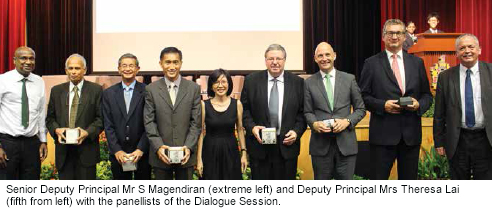 On 11 June, the participants attended a Water Symposium which featured water projects from 15 countries. The participants gained a common understanding of different proposed remedies to the water shortage, which ranged from scientific solutions to water stewardship and community projects. Keynote speakers at this Symposium included Professor Vladan Babovic (Director, NUSDeltares), Professor Glen Kowach (City University of New York) and Professor Kim Irvine (Nanyang Technological University). On 11 June, the participants attended a Water Symposium which featured water projects from 15 countries. The participants gained a common understanding of different proposed remedies to the water shortage, which ranged from scientific solutions to water stewardship and community projects. Keynote speakers at this Symposium included Professor Vladan Babovic (Director, NUSDeltares), Professor Glen Kowach (City University of New York) and Professor Kim Irvine (Nanyang Technological University).
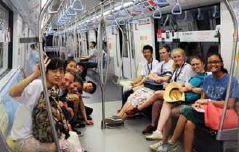 In the Poster and Oral competitions, the RI teams won a gold medal (Ng Wei Chin and Phuah Hui Qi Phyllis) and a bronze medal (Josiah Kek) for their contributions to an investigation into green roof designs, and raising awareness through a water week. Wei Chin and Phyllis's investigation will allow urban planners in Singapore to better design green roofs that have the potential to decrease water flow in drainage systems during periods of heavy rainfall, serving to mitigate flash flooding in urban areas. In the Poster and Oral competitions, the RI teams won a gold medal (Ng Wei Chin and Phuah Hui Qi Phyllis) and a bronze medal (Josiah Kek) for their contributions to an investigation into green roof designs, and raising awareness through a water week. Wei Chin and Phyllis's investigation will allow urban planners in Singapore to better design green roofs that have the potential to decrease water flow in drainage systems during periods of heavy rainfall, serving to mitigate flash flooding in urban areas.
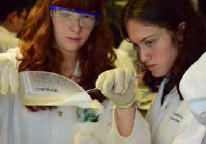 The top special prizes went to the teams from Mahidol Wittayanusorn School (Thailand), Hwa Chong Institution (Singapore), and John Monash Science School (Australia). The team from Mahidol Wittayanusorn School (which comprised Natnicha Plongmai and Tanya Kurutach) explored the possibility of treating canteen wastewater through electrocoagulation, while the team from Hwa Chong Institution (which comprised Daniel Yang, Ng Xiang Han, Kenrick Kwa Zheng Feng and Neville Cheong) tried to find a suitable percentage of PVP and PEG that can be used to create a PVDF membrane that produces optimum performance in terms of pore size, tensile strength, water permeation and removal of particulate matters. Meanwhile, the teams5 from John Monash Science School (which comprised Brendon Aung, Calvin Fletcher, Abigail Hyndman and Heshala Wijerathna) explored the policy of wetland inclusion in open spaces or urban areas, and the benefits associated with wetlands in the long term. The top special prizes went to the teams from Mahidol Wittayanusorn School (Thailand), Hwa Chong Institution (Singapore), and John Monash Science School (Australia). The team from Mahidol Wittayanusorn School (which comprised Natnicha Plongmai and Tanya Kurutach) explored the possibility of treating canteen wastewater through electrocoagulation, while the team from Hwa Chong Institution (which comprised Daniel Yang, Ng Xiang Han, Kenrick Kwa Zheng Feng and Neville Cheong) tried to find a suitable percentage of PVP and PEG that can be used to create a PVDF membrane that produces optimum performance in terms of pore size, tensile strength, water permeation and removal of particulate matters. Meanwhile, the teams5 from John Monash Science School (which comprised Brendon Aung, Calvin Fletcher, Abigail Hyndman and Heshala Wijerathna) explored the policy of wetland inclusion in open spaces or urban areas, and the benefits associated with wetlands in the long term.
 The students also took part in a myriad of engaging activities which included an Amazing Race, Heritage Tour, Field Trips to places such as the NEWater plant, workshops, games and a Culture Night. Overall, the RI-Maurick International Water Conference proved to be a time of challenges, brainstorming and reflection, as well as discovery and friendship. The students also took part in a myriad of engaging activities which included an Amazing Race, Heritage Tour, Field Trips to places such as the NEWater plant, workshops, games and a Culture Night. Overall, the RI-Maurick International Water Conference proved to be a time of challenges, brainstorming and reflection, as well as discovery and friendship.
This article was first published on www.ri.edu.sg on 30 June 2014

|